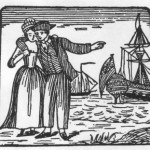“Farewell Lovely Nancy” or “Lovely Nancy” is a traditional ballad collected in 1905 by Cecil Sharp from Mrs. Susan Williams, Somerset (England), where the handsome sailor leaving for the South Seas, dissuades his sweetheart who would like to follow him disguising herself as a cabin boy, telling her that working aboard ships is not for females!
In the sea songs we find sometimes the theme of the girl disguised as a sailor who faces the hard life of the sea for loving and adventure.
The cross-dressing ballads are in fact mostly inherent in women who go to play a male job, such as the sailor or the soldier.
Ralph Vaughan Williams: LOVELY ON THE WATER
Cecil Sharp: LOVELY NANCY
english version: FARE YE WELL/ADIEU, LOVELY NANCY
english version: ADIEU SWEET LOVELY NANCY
american/irish version: ADIEU MY LOVELY NANCY
sea shanty: HOLY GROUND
Farewell Dearest Nancy / Farewell Nancy /
[ Roud 527 ; Master title: Farewell Dearest Nancy ; Laws K14 ; Henry H755 ; Ballad Index LK14 ; Bodleian Roud 527 ; trad.]
AL Lloyd writes in the notes to the LP “A Sailor’s Garland”: To dress in sailor’s clothes and smuggle oneself aboard ship was a pretty notion that often occurred to young girls a century or two ago, if the folk songs are to be believed. This song has been widely found in the south of England, also in Ireland.”
I.
“Fare you well me lovely Nancy
for it’s now I must leave you,
All along the Southern(1) sea
I am bound for to go.
Don’t let my long absence be no trouble to you,
For I shall return in the spring
as you know.”
II.
“Like some pretty little seaboy
I’ll dress and go with you,
In the deepest of dangers
I shall stand your friend.(2)
In the cold stormy weather
when the winds are a-blowing,
My dear I’ll be willing
to wait for you then”
III.
“Well, your pretty little hands
they can’t handle our tackle,
And dour dainty little feet
to our topmast can’t go.
And the cold stormy weather love
you can’t well endure,
I would have you ashore
when the (raging) winds they do blow.
IV.(4)
So fare you well me lovely Nancy
for it’s now I must leave you,
All along the Southern sea
I am bound for to go.
As you must be safe
I’ll be loyal and constant
For I shall return in the spring
as you know.”
FOOTNOTES
1) in Sharp is “salt seas” but becomes “western ocean” in the version of A. L. Lloyd
2) in A. L. Lloyd becomes “My love, I’ll be ready to reef your topsail”.
3) the closing stanza in an Irish version written in Ancient Irish Music (1873 and 1888) by Patrick Weston Joyce says:
So farewell, my dearest Nancy, since I must now leave you;
Unto the salt seas I am bound for to go,
Where the winds do blow high and the seas loud do roar;
So may yourself contented be kind and stay on shore.
Ian Campbell & Dave Swarbrick 1964
John Molineaux (live)
FONTI
http://www.contemplator.com/england/fnancy.html
http://mainlynorfolk.info/lloyd/songs/farewellnancy.html
http://mudcat.org/thread.cfm?threadid=27483
http://www.goldenhindmusic.com/lyrics/FAREWELL.html

